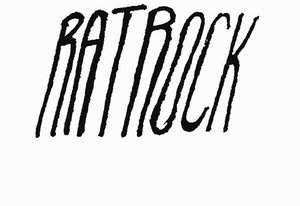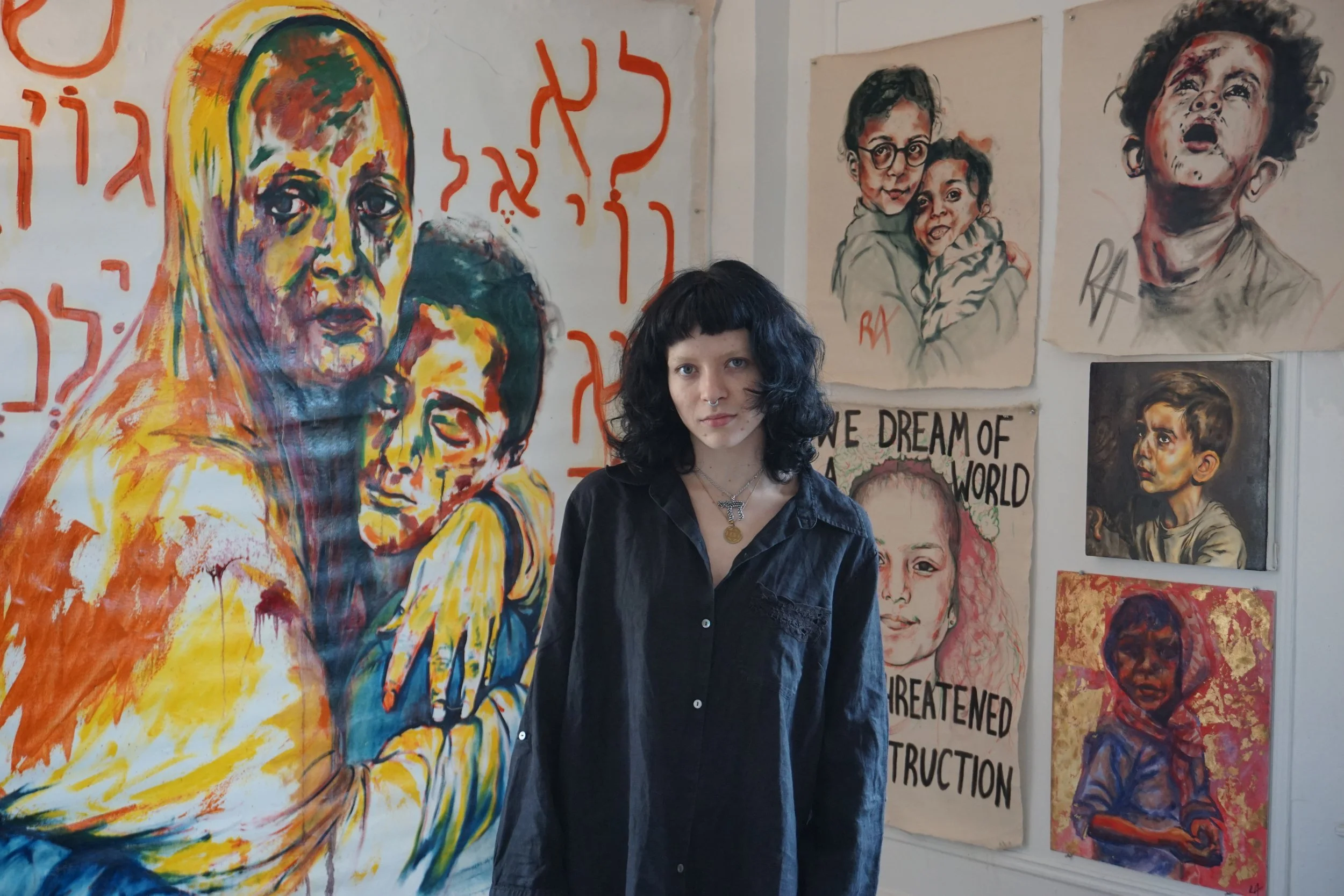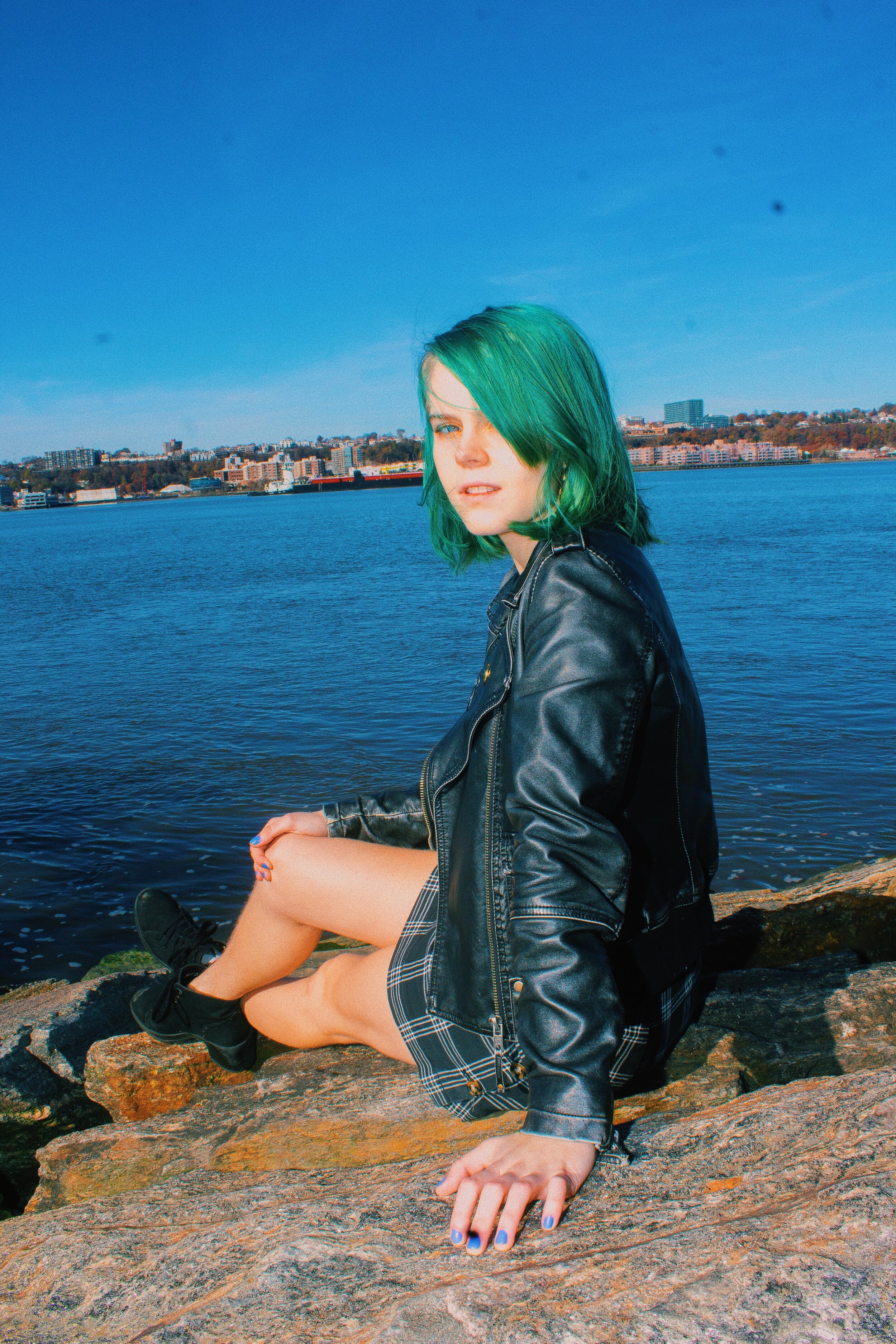
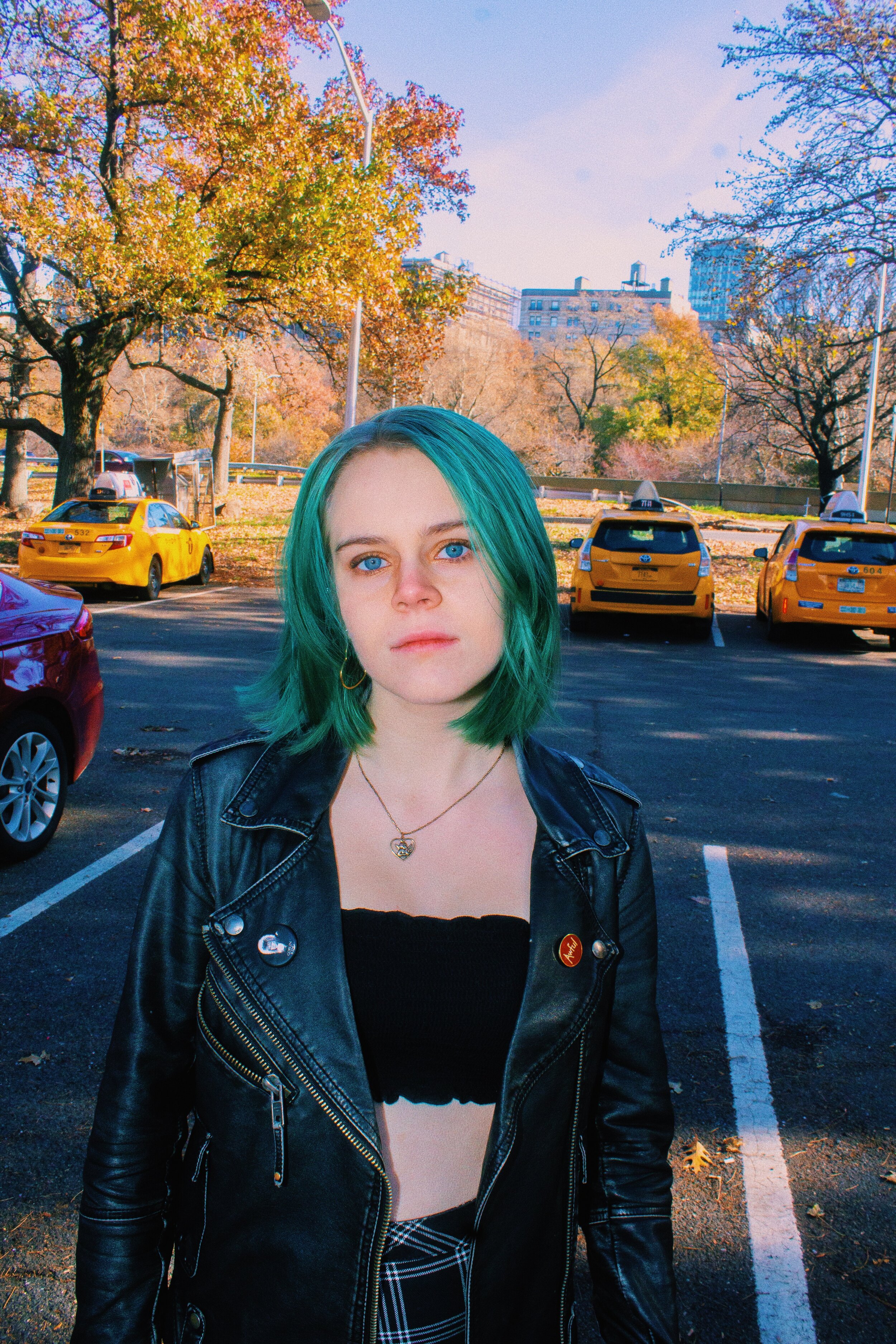
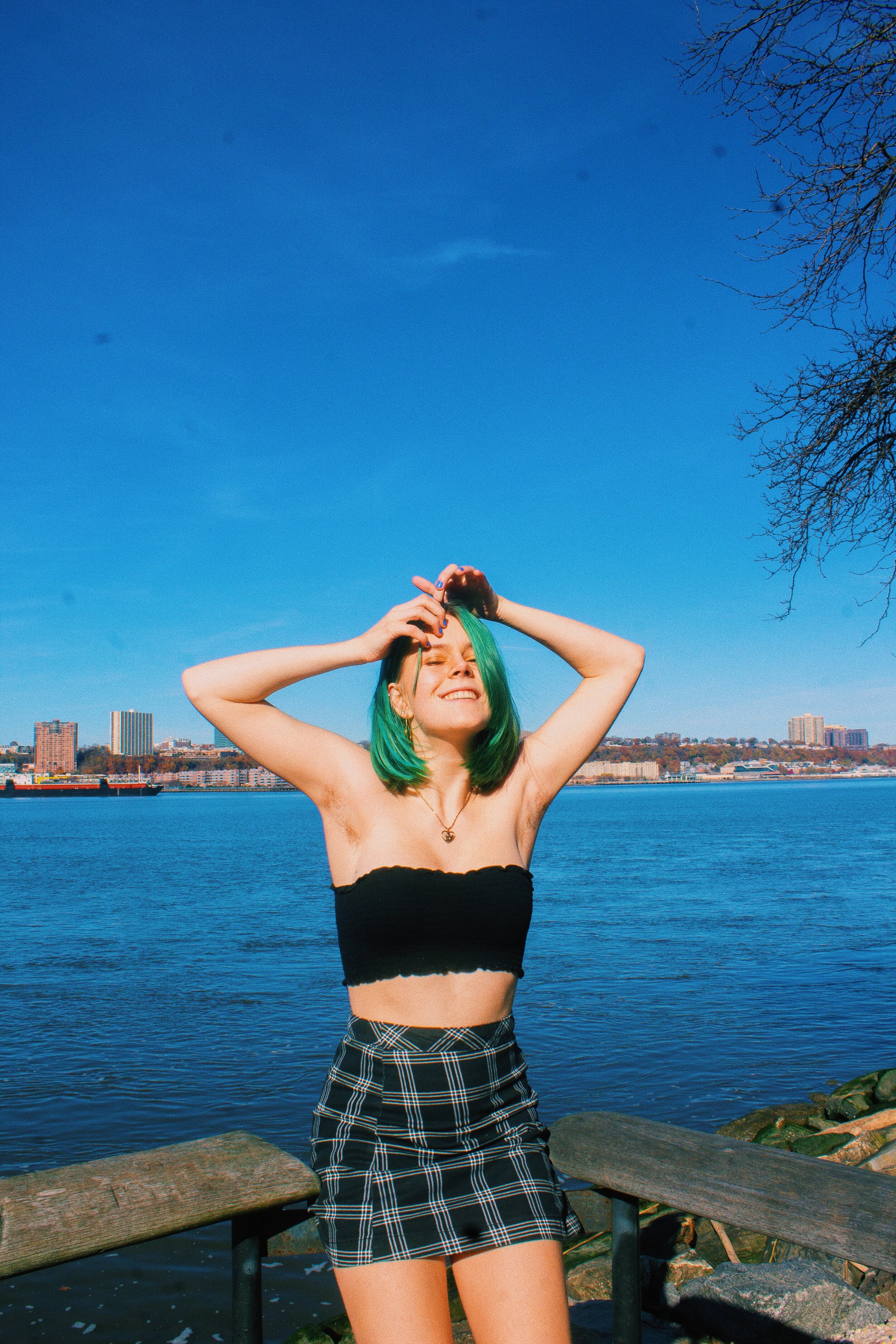
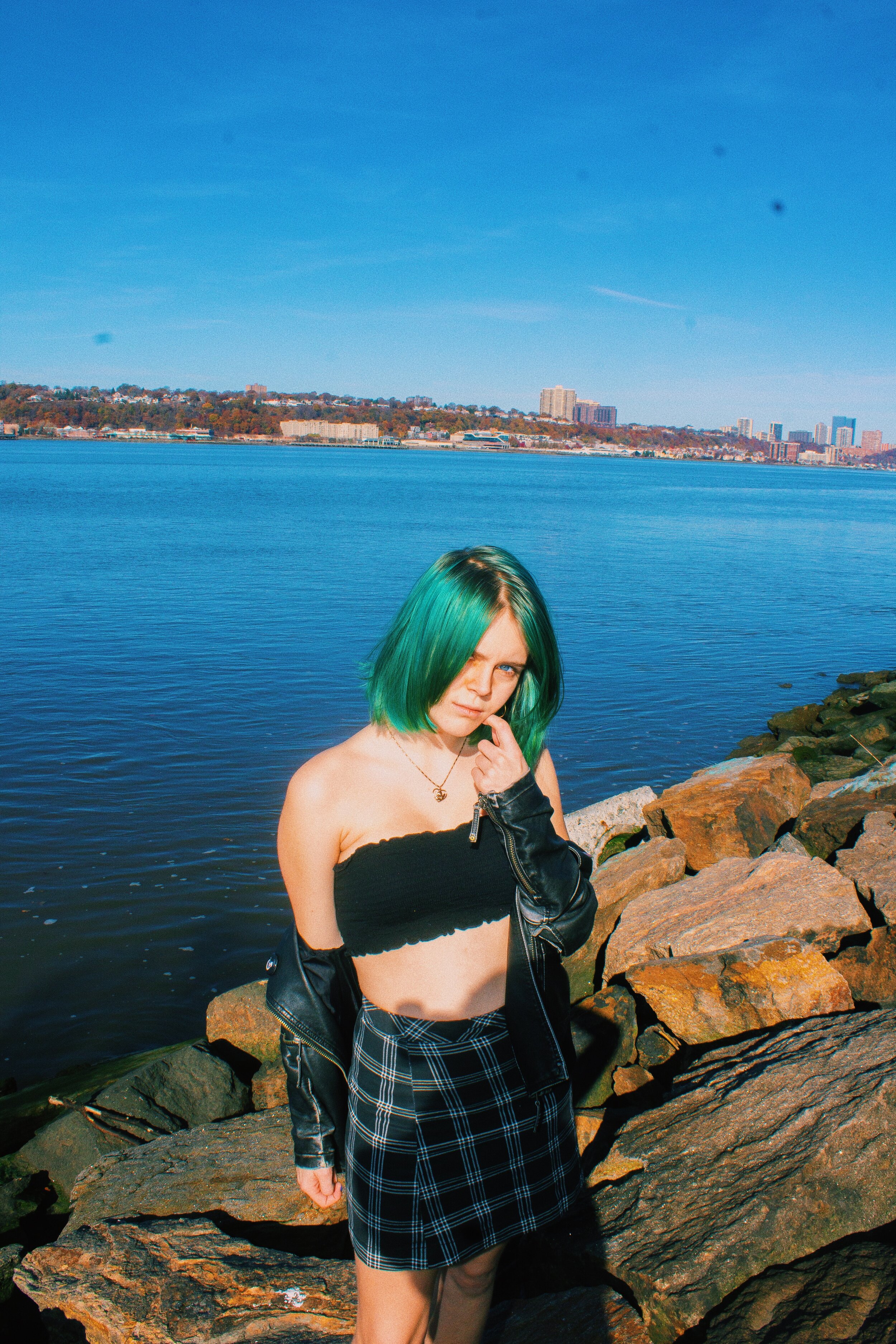
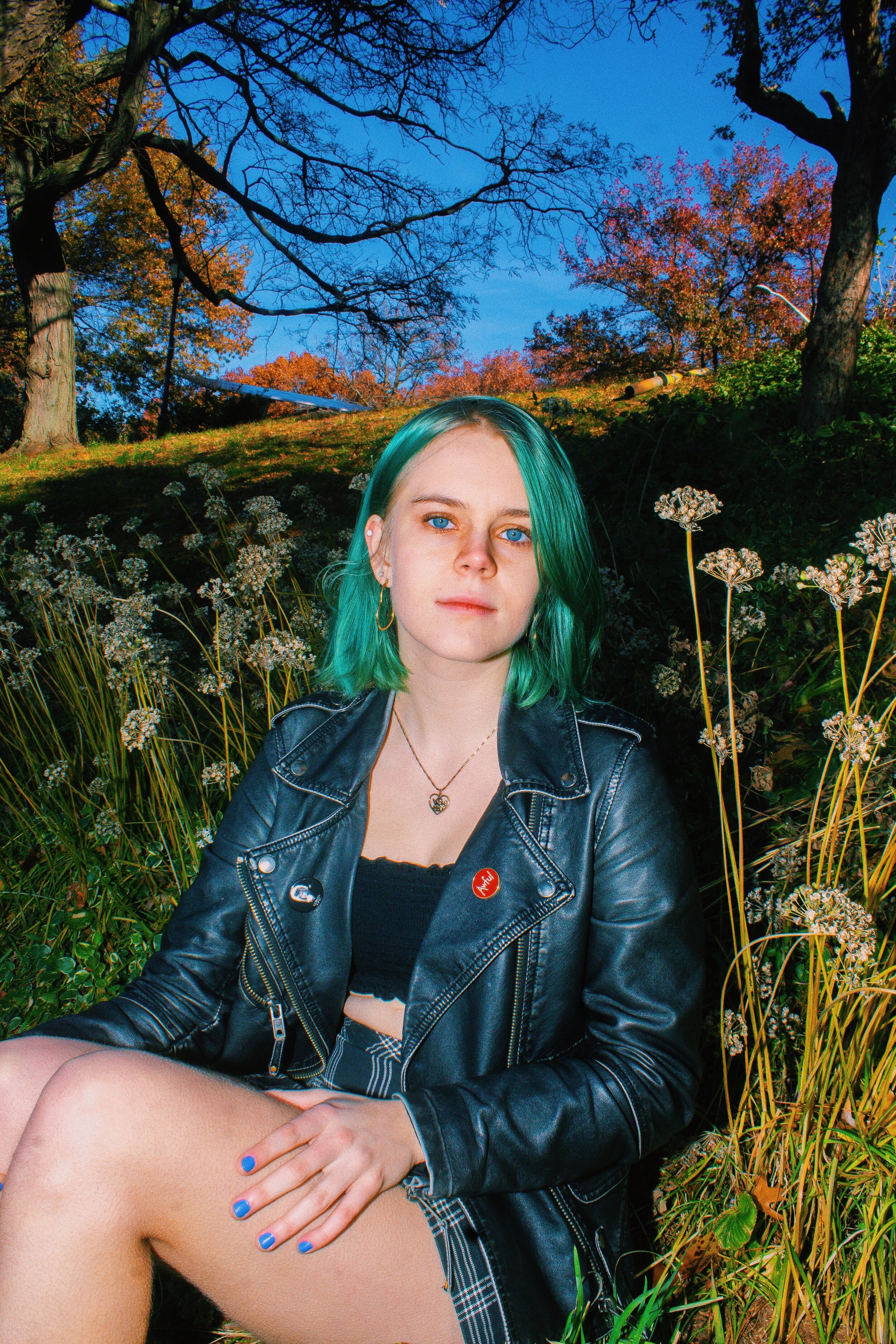
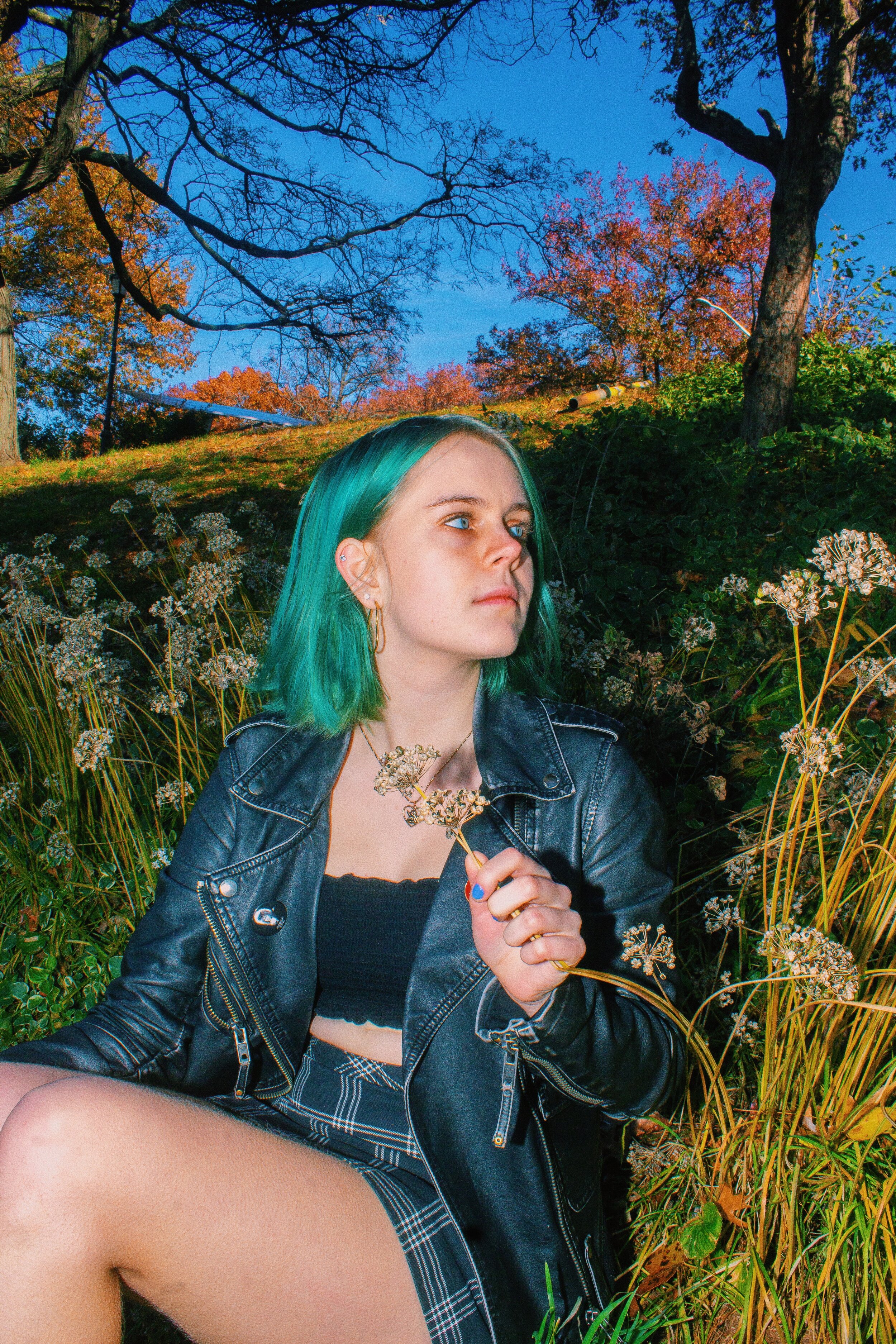
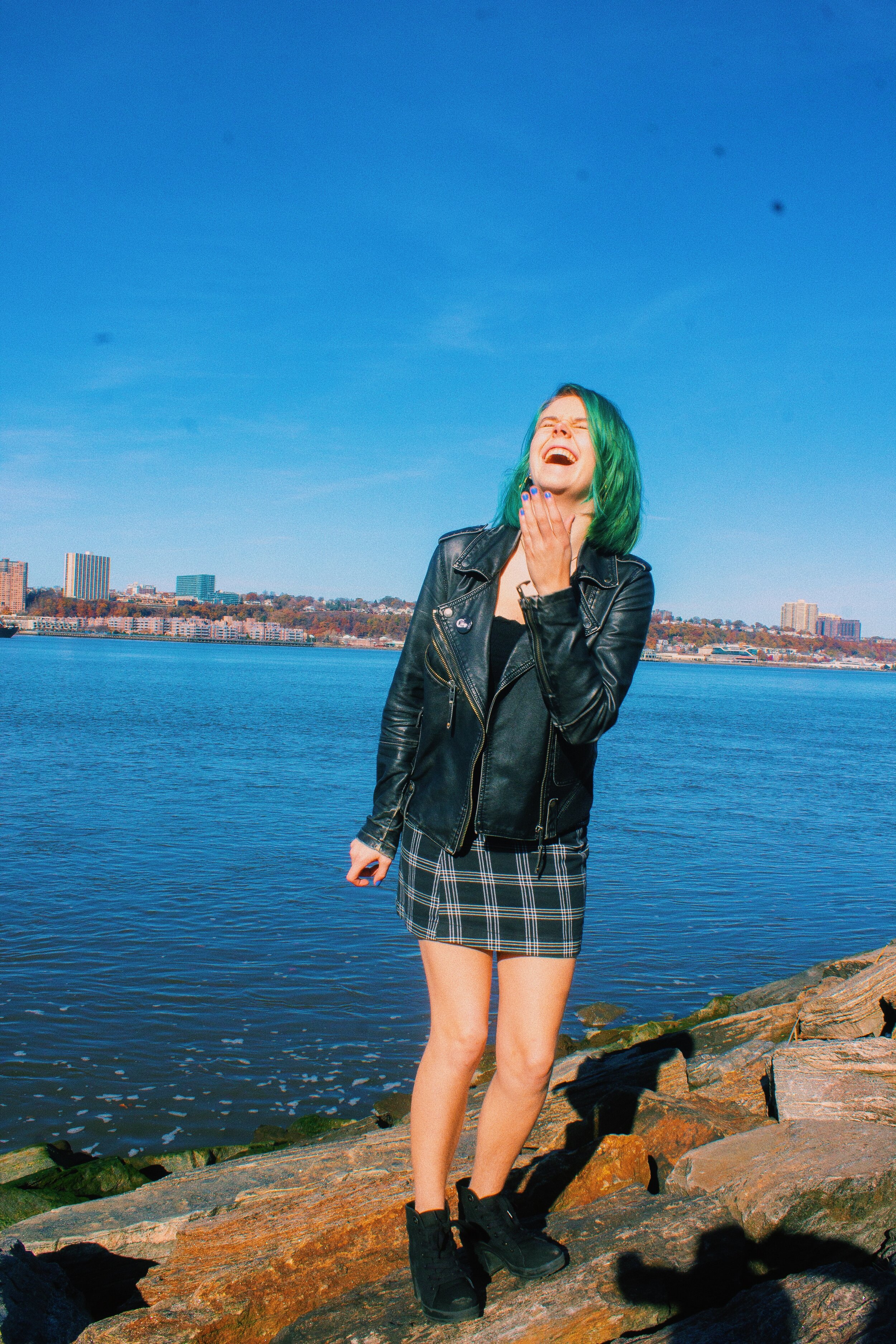
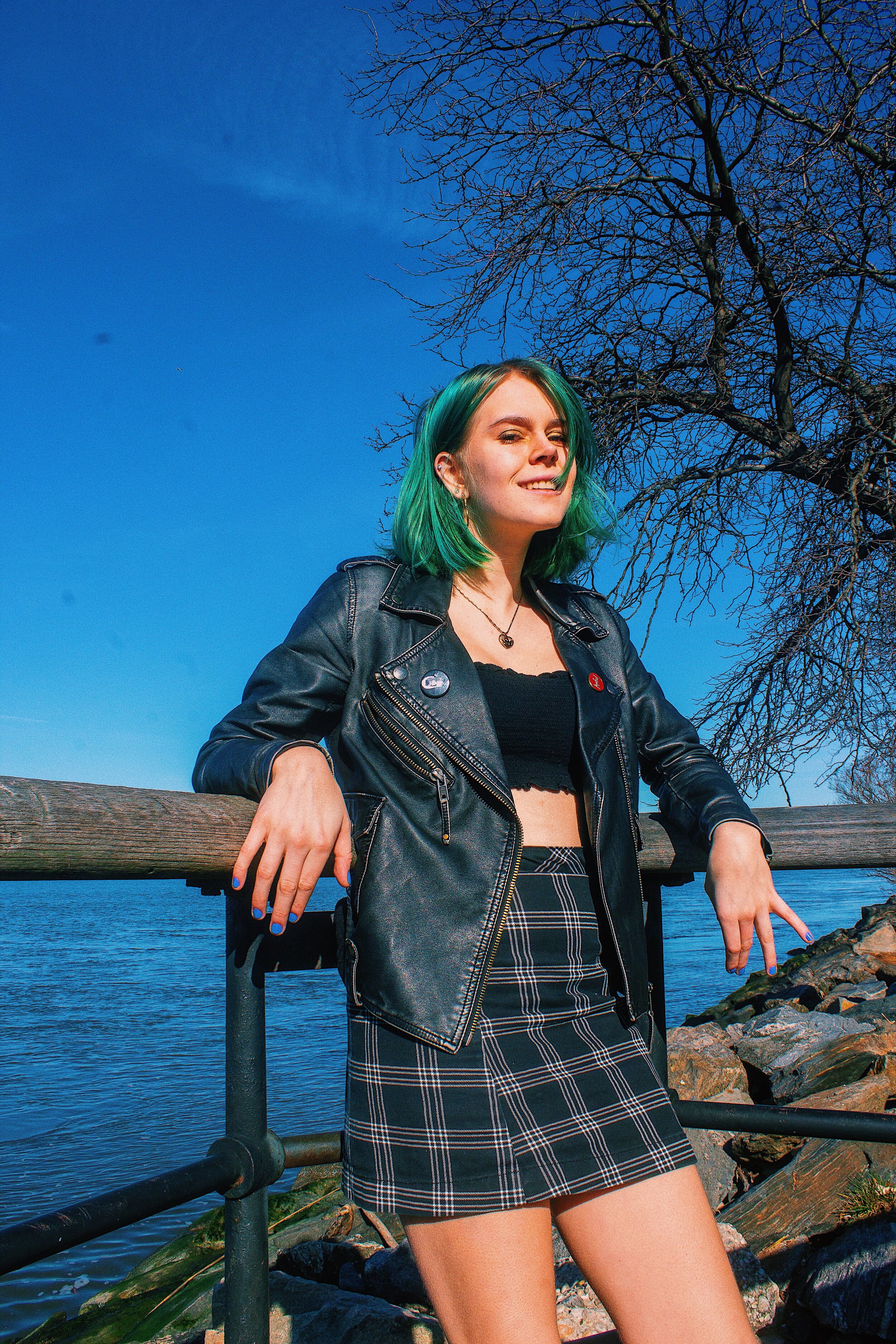
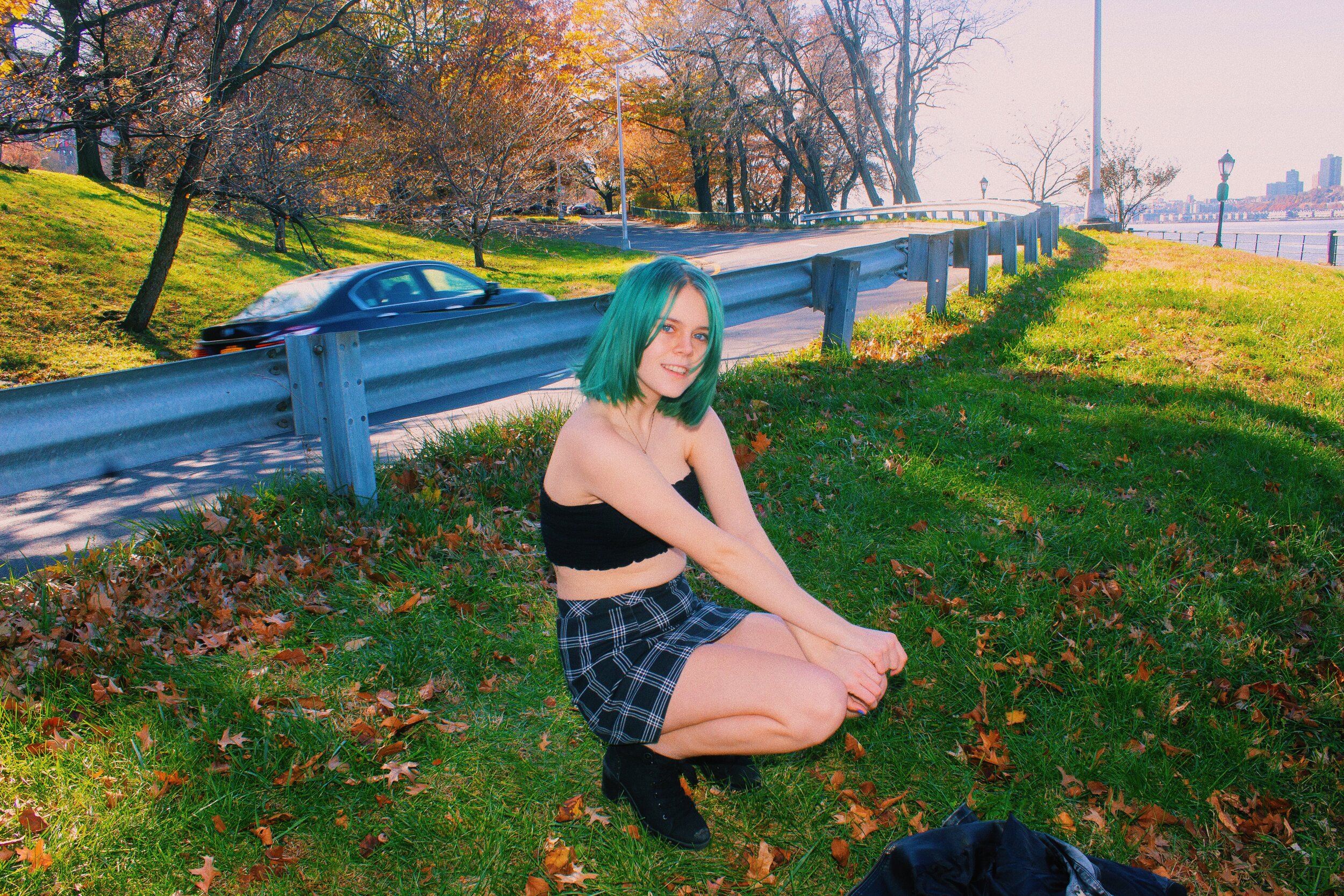

Tess Majors was a Ratrock featured artist for the month of December 2019. We are all grateful to have helped document her passion for music and thoughts as an artist. It was truly a privilege to feature Tess and her work, and we hope that this interview serves as a meaningful testament to her art and her spirit.
——
Interview by Yao Lin
Photographs by Gillian Rae Cohen
Tessa Majors is a grunge-rock musician from Charlottesville, Virginia.
Introduce yourself.
My name is Tessa Majors. I usually go by Tess, though. I am a first-year at Barnard, and I’m from Charlottesville, Virginia.
Did you grow up in the big city, or did you grow up in a more rural area of the town?
I grew up in more of a suburban area than an urban one. I spent most of my time in a town right outside of Charlottesville—about 20, 30 minutes away, called Waynesboro. It was kinda in between suburban and rural, like a small town. And then I moved to Charlottesville at the start of high school, and that was a bit more urban. But it was still nothing in comparison to the scale of New York City.
Tell me a little about [your band], Patient 0. Why the name Patient 0?
I honestly don’t have a lot of significance behind the name. We mostly just thought it sounded cool. Patient 0 is like, when someone is the first person to get a certain disease in an area. So I guess we’re like the Patient 0 for our music, and then it spreads out from us. I thought it kinda went with our edgy, punk music image.
How did the band come together?
I went to a new school in seventh grade, and one of the first people I met there was a girl named Hannah Fowler. She had just started playing guitar when I met her. I was already a musician—I played the piano at the time—and we started doing music together. The two of us worked together on music stuff for like, years, starting in seventh all the way through the end of high school. So Patient 0 is basically our project. We had a couple different drummers play for us. It was what we arrived at, after we played for a ton of different bands together. That was like the final resting place for us.
How would you describe the friendship between you and Hannah?
Our musical relationship has always been good. Our friendship’s kind of up and down, but I feel like—I mean, the past year has been pretty good. But I feel like the ups-and-downs of our friendship are pretty typical of musicians who work together. If you hear about, I don’t know, famous duos—they always have their arguments and they don’t always get along. I think that’s pretty normal. But we’ve always written together, and played together, even when we weren’t getting along super well in our friendship. And she’s still one of my best friends, to this day. She’s going to Smith College now. And we have a show planned for our winter break—but I’m not sure what the future of the band is, since we’re going to different schools.
Describe your writing process in terms of musical scores and lyrics. Are they simultaneous? Or do you produce the lyrics first, then the music to accompany it?
That’s a good question. My music writing process doesn’t happen in any particular order. It’s kinda just what comes to me first. Sometimes I’ll get an idea for a score progression and melody line—so I’ll roll with that, and come up with lyrics later. Or on the flip side, I’ll come up with some lyrics, and then I’ll come up with something to accompany those lyrics later. Sometimes I will have lyrics and music, and I realize they actually go together, so I combine them—like two separate entities. Hannah and I, for our album, wrote probably five out of nine songs together. Two of the rest were mine, and two of them were hers, so it was an even split in terms of writing. But I also have a lot of songs that are mine that haven’t been recorded yet, or put out anywhere.
What is your favorite song you have ever written, and what is the story behind it?
My favorite song I have ever written is “Prom Queen,” which is on our album Girl Problems. It’s the last song on the album, and it’s been the most popular one recently—it’s been doing pretty well on Spotify. That song was really personal to me, and almost hard to put out because I wrote it about one of my friends. I had to get this one person’s consent before I recorded it and put it out, because it was a personal song about this individual. It’s kinda just about—you get this idea of someone in your head, and you kinda idolize them and build them up to a certain thing. And you realize at the end of the day they’re just a person. And the song starts out—or the first line is, ‘Remember the night she rose from the sea.’ And that’s me painting this person as an Aphrodite-like figure, coming out of the sea. It’s just my realization that I’ve built up this whole narrative in my head of what I think is going on, and this person doesn’t feel the same way about me at all. It’s me coming to that realization, and [being] really crushed by it. I guess it makes it more complicated that it was one of my female friends, who I realized I had feelings for. I kinda had to grapple with that, and grapple with what exactly that meant for my identity, you know? It was a whole mess. But luckily I’m still really good friends with the person, and we got our stuff sorted out. She actually likes the song, so it didn’t end up being a big deal at the end of the day. But that was definitely my way of dealing with the situation and processing it, so I understood it a little bit better.
So you mentioned the idealized view of your friend in “Prom Queen,” and you also mentioned stereotypes—the simplified ideals people hold for others. What were the stereotypes when you were growing up in Charlottesville, and do you feel like you are a departure from them?
Luckily, Charlottesville is a pretty diverse community—I definitely struggled less when I moved there, because I found lots of people who were like me. The music scene is really great and really welcoming. But I will say the main stereotype that I depart from—the stereotypes for all women, particularly so in the South—is that you have to be nice, and be complacent, because you don’t want to start any conflicts. And that was never my personality. I would get into a lot of verbal arguments in high school with people, because they would say things that I didn’t agree with, or that I felt demeaned by. Instead of just sitting there and taking it, I would say something about it. And that wasn’t always received super well, and I guess that was the way I was a bit different from other people. And I am sure that other girls wanted to do the same thing—I’m not blaming them or faulting them for not standing up for themselves. But we’ve just been so conditioned as women to behave a certain way, that it’s really hard to do that.
That reminds me of the Riot Grrrl scene of the 90s. Back then, punk rock was a very misogynistic industry. The male bands were using very misogynistic names—but on the other hand, there were a bunch of female bands coming out and writing these rebellious songs. Do you feel that there is still misogyny in today’s music scene?
I think there’s definitely still misogyny within the scene. I find that to be the case sometimes when I’m trying to get my music out there, and I feel like people don’t want to hear me as much because I am a woman. But luckily I think that that’s changing. I think the trend overall is changing, because there are so many incredible women in the rock genre right now. And not just the rock genre! There are so many women in hip hop right now as well, which is traditionally a male-dominated genre. So the fact that there is a female presence in these historically male-dominated fields—it gives me hope for the future.
How did you discover punk rock, and how has punk rock influenced you?
I grew up with punk rock. My parents both put me onto a lot of older music. I remember my dad playing 90s bands, like Pixies, when I was younger. And my mom played me Hole and Nirvana. So a lot of it was my parents’ music taste, for sure. And it’s definitely influenced me in pretty much every aspect of my life. Once I started listening to all of these amazing female punk rock singers—like Joan Jett, or Courtney Love, or more modern people like Courtney Barnett—I realized that I didn’t have to sit there and take anything from anyone. I had a voice and I had power and autonomy. I think it’s definitely changed the way I carry myself; music overall gave me a lot of confidence.
Do you think the writing process, for you, is a process of figuring yourself out?
For sure! Every song I write usually starts out as an unresolved question I have—something that’s lingering in my mind, that’s bothering me, usually. And these songs become a way for me to answer those questions. I gave the example of “Prom Queen” earlier, but another one is my song “Not the First One,” which is on the album. I wrote it after I got out of a brief romantic fling with someone, and they kinda thought they could walk all over me. I had this question in my head like, “What made this person think that they could do that?” And the whole premise is that, “You’re not special, you’re not the first one to walk all over me, and so go fuck off!” Essentially.
So you mentioned earlier that you’ve been on gigs with Hannah, or with your band. How does it feel to have connections with your audience through music?
See, I love Charlottesville—and I love the spaces that they have for musicians to perform. I wish there were more, but the ones that they have are pretty good. I got to gig a lot when I was in high school, and I played shows pretty frequently. My friends would show up to them in pretty big numbers, just to have a great time and dance. It was so fun to see people connecting with my music, and it’s just a very powerful experience to see that other people relate to what you’re saying. Towards the end, people actually started knowing the words to songs, and singing along, which is also really fun. It was the same friends who came to see me for three years—so they know my songs by heart, which I think is really special.
Have you ever played any covers at your gigs?
Yeah! That’s how I started out gigging, I only did covers. I played in a lot of bands in middle school that were just cover bands. We would cover Led Zeppelin, Nirvana, Foo Fighters—all that classic stuff. And gradually, we were just kinda incorporating more and more original music into the set. By the time I was a sophomore in high school, it was half covers and half originals. And by the time I made it to the end of senior year, it was all originals.
What’s your favorite instrument?
My favorite instrument to play is for sure the bass. I play piano, guitar, and bass—but bass is my favorite because I like how it’s at the intersection between melody and rhythm. This makes it really fun, because bass drives songs a lot of times. When you want to dance, it’s usually the bass that makes you want to dance. I also really like being a bassist because there aren’t too many people who are bassists and singers, so that makes me kinda unique in terms of bands—because it’s just not as common as being a guitarist and a singer.
How would you describe your particular bass sound?
I would say I definitely base my bass sound off a lot of 90s bands, like the Red Hot Chili Peppers, and definitely Sonic Youth. But I also like a lot of the modern R&B bass lines. Recently I learned the bass line of “Pink + White” by Frank Ocean, and that’s so fun to play. I think R&B has a very special way of articulating the bass, and it’s just—I connect to that.
Where do you see yourself in five years as a musician?
I hope that I’m touring. Music is what I love and what I’m passionate about, so I really want to do something with it. So ideally, in five years, I would have a steady band, and be in the studio and touring—making a career out of music. It’s hard to do, but I think I can do it.
What about ten years? Still touring?
That is an interesting question, because I actually want to get into some of the audio engineering business. I think after a while—I mean, great music is great music, but there’s something to be said for being young and more marketable. It would be nice to have a plan that’s more long-term, because you can’t tour forever. It’s tiring, it’s exhausting. So I would ideally get involved with producing somehow—mixing, mastering, all that happens in the studio. That will be really helpful for my own music too, because then I wouldn’t have to pay someone else to do it. I could just do it myself. I was actually going to try to learn how to do that at CU Records sometime this semester, because they have classes that teach you how to use the software.
What about your parents? You mentioned earlier that they are strong influences.
My parents are incredibly supportive, and I’m so grateful for them. I’m pretty sure that they’re cool with me doing whatever I want, as long as I’m happy. And they know that music is what makes me happy. My dad is actually a writer, so he knows what it’s like being in the arts field and trying to make a career out of what you love. So I think that he’s supportive, but at the same time he’s also like, “Be aware, it’s a hard field to go into.” He wants to be supportive, but he also wants to warn me of how difficult it can be. My parents are great. I have a younger brother who is also great.
What is your favorite band?
That’s a really hard question. I have a couple. But none of them are bands, they’re all solo performers. I will say my three favorite artists are Courtney Barnett, David Bowie, and Frank Ocean. Which is kind of an eclectic mix—but I think that David Bowie definitely influenced Frank Ocean, and, I mean, everyone. He’s incredibly iconic. In terms of fashion sense too, I really love David Bowie. One thing I’ve been trying to do in my shows is to always have a really fun outfit— and I think that is definitely because I grew up listening to and watching David Bowie. It’s not just about the music, it’s about the overall image.
Bowie has gone through a series of changes throughout his career. His music is a reflection of his life, and I can definitely see that in you too. Do you see yourself switching from punk rock to another genre in the future?
For sure! I never want to limit myself in terms of genre. And in terms of listening, I listen to everything. My music taste is really expansive, so if I feel compelled to make music that is in a different genre, I’ll just go with it. But I think that what my music is always going to be—even if not stylistically punk—it’ll be influenced by the punk attitude and the punk spirit.
How would you describe the punk attitude and the punk spirit?
Don’t let other people’s opinions of you influence your opinions of yourself. Dress and act in a way that makes you feel good about yourself, even if it’s outside of the societal norm. Don’t blindly trust authority figures. Always ask [hard] questions, no matter what—even to people you love, you should ask questions. I think questioning is a big part of the punk mentality—not just accepting stuff but thinking deeply about it, which is so often overlooked because punk is so simplistic. But when you think about it, [punk] can be really intellectual in that way, because it’s constantly asking the big questions about what’s important. And I will say, in terms of advocacy—and I think that’s also an important part of the punk movement—I really care a lot about the environment. I feel like my music has gotten increasingly anti-consumerist. Music, it’s about your emotions, but it can also be used to spread a message. And the message I want to spread is that something has to change about the system that we’re in right now. It’s just not sustainable.
Are you involved in any other social movements? Do those also influence you?
I’m involved with some environmental advocacy groups, and I’m signed up for a bunch of social justice related email lists. I’m just trying to stay updated by watching the news and stuff like that. And I think it’s so important to be informed.
How would you describe your music?
My music is a pretty true depiction of teenage life, because it’s an equal mix of sincere emotions and sarcasm and snarkiness—which I think is pretty typical of the teenage mentality, because you kind of switch between being super mad, super sad, super happy. Feeling these strong emotions, to just being super disenchanted by everything, like, “Nah, this is stupid.” It’s a contradiction, but it’s a contradiction a lot of people live with, especially teenagers.
Is there anything else that you want to add?
I guess it makes sense to talk about what I’ve been doing since I got up here. I played one show for Snock at Columbia, which hosts shows—all student bands, pretty much. I had a friend of mine, J.C., playing guitar for me. He goes to Columbia. And I had my friend Chris, who goes to NYU, playing drums. And we did some of my new songs, and that was fun. I’ve written like three or four songs since I’ve come up here. So for the future, I’m just trying to get a steady group up here. I think that will be really helpful because I want to start playing shows again. Over winter break, I’m going to try to go home and record an EP. I’m not sure if that’s gonna be by myself, with Patient 0, or with another group—but I have a lot of songs of mine that are written and just haven’t been recorded yet, so I want to get those out. I feel like there is this need as a musician to be constantly producing new content—which can be really hard. But if you want to keep your band and your audience engaged, you have to put new stuff out there.
What’s a favorite song of yours?
I want to shout out my friend Chris Murphy, because he played drums for me for my Snock show, and he’s been one of my long-time inspirations, competitors, collaborators. We went to school together in Charlottesville. He goes to NYU. He has an album out that’s really great, and I’ll shout out his song called “Can’t Fight.” He wrote it when he was gonna be opening for me for a show, and he realized none of his songs were punk rock enough. He wrote it specifically for the show—which I think it’s just hilarious, and demonstrates how we push each other as musicians.
You mentioned new songs. What are those about?
My new songs, they’ve kinda been tackling similar [issues] as my old songs. Relationships, and just general emotions about the world. But I feel like my lyricism has gotten more nuanced. Like, I’m getting much better at saying exactly what I want to say, because that has been a problem for me in the past—deciding what exactly I want to say. So I think I’ve gotten better at doing that.
Interesting! So you think that it’s a growing process to be constantly producing music. The more you do it, the more mature you become.
For sure.
Any parting words for our readers?
High school sucks. Don’t judge the rest of your life based off how high school is. And—listen to my album! [laughs]
